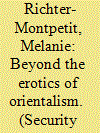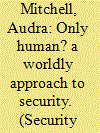| Srl | Item |
| 1 |
ID:
127803


|
|
|
|
|
| Publication |
2014.
|
| Summary/Abstract |
Contrary to commonsense understandings of torture as a form of information-gathering, confessions elicited through the use of torture produce notoriously unreliable data, and most interrogation experts oppose it as a result. With a focus on the US carceral regime in the War on Terror, this article explores the social relations and structures of feelings that make torture and other seemingly ineffective and absurd carceral practices possible and desirable as technologies of security. While much of international relations scholarship has focused on the ways in which affective and material economies of Orientalism are central to representations of the 'terrorist' threat, this article connects the carceral violences in the racialized lawfare against Muslimified people and spaces to the capture and enslavement of Africans and the concomitant production of the figure of the Black body as the site of enslaveability and openness to gratuitous violence. The article further explores how these carceral security practices are not simply rooted in racial-sexual logics of Blackness, but themselves constitute key sites and technologies of gendered and sexualized race-making in this era of 'post-racial triumph' (HoSang and LaBennett, 2012: 5).
|
|
|
|
|
|
|
|
|
|
|
|
|
|
|
|
| 2 |
ID:
127805


|
|
|
|
|
| Publication |
2014.
|
| Summary/Abstract |
Refugee camps are increasingly managed through a liberal rationality of government similar to that of many industrialized societies, with security mechanisms being used to optimize the life of particular refugee populations. This governmentality has encompassed programmes introduced by the United Nations High Commissioner for Refugees (UNHCR) and various non-governmental organizations (NGOs) to build and empower communities through the spatial technology of the camp. The present article argues that such attempts to 'govern through community' have been too easily dismissed or ignored. It therefore examines how such programmes work to produce, manage and conduct refugees through the use of a highly instrumentalized understanding of community in the spatial and statistical management of displaced people in camps. However, community is always both more and less than what is claimed of it, and therefore undermines attempts to use it as a governing tactic. By shifting to a more ontological understanding of community as unavoidable coexistence, inspired by Jean-Luc Nancy, we can see how the scripting of and government through community in camps is continually exceeded, redirected and resisted. Ethnographies of specific camps in Africa and the Middle East enable us both to see how the necessary sociality of being resists its own instrumentalization and to view the camp as a spatial security technology. Such resistance does not necessarily lead to greater security, but it redirects our attention to how community is used to conduct the behaviour of refugees, while also producing counter-conducts that offer greater agency, meaning and mobility to those displaced in camps.
|
|
|
|
|
|
|
|
|
|
|
|
|
|
|
|
| 3 |
ID:
127800


|
|
|
|
|
| Publication |
2014.
|
| Summary/Abstract |
Harm does not happen to humans in isolation, but rather to worlds composed of diverse beings. This article asks how worlds and the conditions of worldliness should be framed as 'subjects of security'. It explores three possible pathways: rejecting anthropocentrism; expanding existing ethical categories; and adopting 'new materialist' ontology and ethics. Ultimately, it argues for a fusion of the key elements of each of these pathways. This offers the basis for a new concept of harm ('mundicide') specifically intended to reflect harms to worlds and the conditions of worldliness. The value of this concept is demonstrated in the light of an empirical example: the 'Rainforest Chernobyl' case. The article concludes that a worldly approach is necessary if we are to capture the full enormity of the harms confronted by international security.
|
|
|
|
|
|
|
|
|
|
|
|
|
|
|
|
| 4 |
ID:
127806


|
|
|
|
|
| Publication |
2014.
|
| Summary/Abstract |
This article examines the impact of the practices of private security companies (PSCs) upon the fields of security and politics in the Czech Republic. It focuses on the scandalous case of the largest Czech private security company, Agency of the White Lion (ABL)/Mark2 Corporation (M2.C), whose founder attempted to create a business-firm-party by performing a hostile takeover of an existing minor political party. By applying the global security assemblages model and drawing on the recent literature on the commodification of security, this article situates the case of ABL/M2.C within the larger socio-political-legal-economic context of the booming private security industry, whose extensive linkages with Czech politics are best characterized as a 'reverse revolving door' phenomenon. This phenomenon in turn suggests a possibility that the continuing absence of specific legislation to regulate the activities of PSCs is due to too much, rather than too little, political interest in the activities of these organizations. This is problematic because the practices of PSCs have already contributed to a significant rearticulation of the Czech security field by enhancing the commodification of security, while ABL's use of security methods for political purposes has rearticulated the field of politics in a number of profoundly negative ways.
|
|
|
|
|
|
|
|
|
|
|
|
|
|
|
|